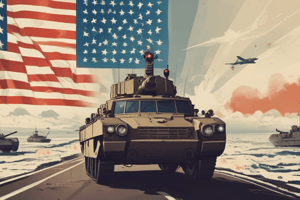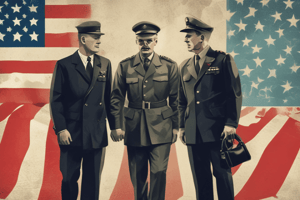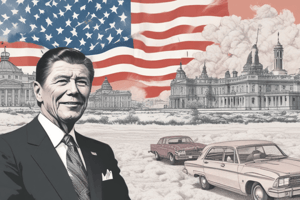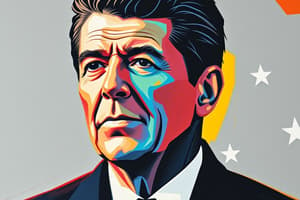Podcast
Questions and Answers
Who were the Presidents during the Cold War?
Who were the Presidents during the Cold War?
- Kennedy, Johnson, Nixon, and Ford
- Truman, Eisenhower, Kennedy, and Nixon (correct)
- Eisenhower, Nixon, Reagan, and Bush
- Truman, John, Kennedy, and Johnson
What was the name of Truman's foreign policy?
What was the name of Truman's foreign policy?
Containment
What was the Marshall Plan?
What was the Marshall Plan?
A program to help countries that remained democratic avoid communism.
What was the Berlin Airlift?
What was the Berlin Airlift?
What does NATO stand for?
What does NATO stand for?
What is the purpose of the UN?
What is the purpose of the UN?
Eisenhower's foreign policy is known as ______.
Eisenhower's foreign policy is known as ______.
What does MAD stand for?
What does MAD stand for?
What was the Domino Theory?
What was the Domino Theory?
What was the Bay of Pigs?
What was the Bay of Pigs?
What was the purpose of the Apollo Program?
What was the purpose of the Apollo Program?
What was the Peace Accords?
What was the Peace Accords?
What does Vietnamization refer to?
What does Vietnamization refer to?
What were the Pentagon Papers?
What were the Pentagon Papers?
What was the SALT agreement?
What was the SALT agreement?
What was the Helsinki Accords?
What was the Helsinki Accords?
What was the War Powers Act?
What was the War Powers Act?
Flashcards
Containment Policy
Containment Policy
Aimed to limit the spread of communism through various strategies.
Marshall Plan
Marshall Plan
Provided aid to democratic nations to prevent them from falling under communist influence.
Berlin Airlift
Berlin Airlift
Transport of goods to West Berlin during Soviet blockades.
NATO
NATO
Signup and view all the flashcards
Massive Retaliation
Massive Retaliation
Signup and view all the flashcards
"New Look" Strategy
"New Look" Strategy
Signup and view all the flashcards
Brinkmanship
Brinkmanship
Signup and view all the flashcards
MAD (Mutually Assured Destruction)
MAD (Mutually Assured Destruction)
Signup and view all the flashcards
Domino Theory
Domino Theory
Signup and view all the flashcards
Flexible Response
Flexible Response
Signup and view all the flashcards
Bay of Pigs Invasion
Bay of Pigs Invasion
Signup and view all the flashcards
Cuban Missile Crisis
Cuban Missile Crisis
Signup and view all the flashcards
Détente
Détente
Signup and view all the flashcards
Vietnamization
Vietnamization
Signup and view all the flashcards
SALT (Strategic Arms Limitation Talks)
SALT (Strategic Arms Limitation Talks)
Signup and view all the flashcards
War Powers Act
War Powers Act
Signup and view all the flashcards
Pentagon Papers
Pentagon Papers
Signup and view all the flashcards
Study Notes
Cold War Presidents and Their Foreign Policies
- Cold War relevant presidents include Truman, Eisenhower, Kennedy, and Nixon, shaping US foreign relations.
Truman's Foreign Policies
- Containment aimed to limit the spread of communism.
- The Marshall Plan provided aid to democratic nations to prevent communist influence.
- The Berlin Airlift facilitated the transport of goods to West Berlin during Soviet blockades.
- NATO was established as a military alliance among the US, Canada, and Western European nations against Soviet threats.
- The United Nations was formed to promote international peace and security.
- Six prongs of containment included developing atomic weapons, strengthening military alliances, enhancing espionage, and utilizing propaganda.
Eisenhower's Foreign Policies
- Massive Retaliation threatened full military response to any communist aggression.
- "New Look" strategy emphasized nuclear weapons to deter potential threats.
- John Foster Dulles, as Secretary of State, played a key role in shaping foreign policy.
- Brinkmanship involved threatening war to deter Soviet expansion.
- MAD (Mutually Assured Destruction) relied on the premise that nuclear war would lead to mutual annihilation.
- The Domino Theory suggested that communist victories could lead to neighboring countries falling to communism.
- In Guatemala, the CIA overthrew the leader due to his communist affiliations.
- In Cuba, the CIA's failure to assist Castro drove him closer to the Soviet Union.
- The Eisenhower Doctrine mandated US intervention to combat communism in the Middle East.
- Troops were sent to Vietnam based on fears of communist expansion.
Kennedy's Foreign Policies
- Flexible Response allowed for various military options rather than just nuclear threats.
- The Bay of Pigs invasion was a failed attempt to oust Castro, contributing to heightened tensions.
- The Cuban Missile Crisis led to a nuclear standoff, resulting in a blockade and eventual negotiations removing US missiles in Turkey.
- The Apollo Program was initiated to compete with Soviet space achievements after Sputnik.
- The Berlin Crisis led to a military buildup in response to Soviet threats against West Berlin.
- Special Forces were deployed for covert operations against guerrilla fighters in Asia.
- Kennedy increased military involvement in Vietnam, often employing destructive tactics that harmed civilians.
Nixon's Foreign Policies
- Detente represented a strategy to ease tensions with the USSR focusing on arms control and trade.
- Nixon's incursion into Cambodia aimed to support anti-communist forces following a coup.
- The Peace Accords granted North Vietnamese forces a presence in South Vietnam as US troops withdrew.
- Vietnamization sought to transition military responsibilities to South Vietnam while reducing US presence.
- Henry Kissinger was pivotal in developing the policy of detente.
- Nixon leveraged tensions between China and the USSR to facilitate US withdrawal from Vietnam and improve relations with China.
- The Pentagon Papers revealed government dishonesty regarding the Vietnam War, impacting public support.
- SALT (Strategic Arms Limitation Talks) aimed to limit nuclear arms proliferation between the US and USSR.
- The Helsinki Accords recognized post-WWII borders in Europe and Soviet influence in Eastern Europe.
- Nixon’s administration backed authoritarian regimes in the Middle East to counter communism, notably supporting Israel, which led to an oil embargo.
- The War Powers Act required presidential approval from Congress before deploying troops abroad, curtailing executive military power.
Studying That Suits You
Use AI to generate personalized quizzes and flashcards to suit your learning preferences.




